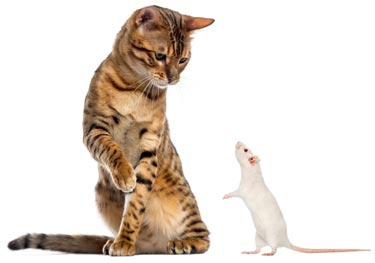Mouse Poison Ingestion in Cats

When homeowners put out rodenticides, poisons designed to bait and kill mice and rats, they are putting their own pets and those of their neighbors at risk, as well, including cats.
How Do Rodenticides Work?
There are several different ingredients that might be used to make rat poison. Long-acting anticoagulants are the most common, and they work by causing internal bleeding in the animal that ingests them. Others contain ingredients that trigger kidney failure, brain swelling, or phosphine gas development in the stomach.
All of these different types of poisons work on dogs, cats, and humans as well as they work on mice and rats.
How Do Cats Get Poisoned by Rodenticides?
Cats can be poisoned by mouse and rat poison by ingesting it directly themselves. These poisons are made to be enticing to eat, and cats can fall victim to this characteristic.
Cats can also be poisoned by rodenticides secondarily, which means that they ingest the poison when they eat a rodent that consumed the bait. This creates a danger for cats even in homes where rodenticides aren't put out. Rodents don't die immediately when they consume these baits, so they can move to other areas and then be caught, killed, and eaten by a cat in an entirely different yard or home.
Signs of Rodenticide Poisoning in Cats
The signs that will be presented by a cat that has ingested rodenticide will depend on the type of poison used in the product. Some signs might include:
- Pale gums
- Red, pin-point areas or large bruises on multiple areas of the skin, gums, or in the whites of the eyes
- Weakness
- Lethargy
- Bleeding from the nose or into the urine or stool
- Vomiting
- Seizures
If you think your pet might have ingested rodenticide, don't hesitate to visit the veterinarian. Early, aggressive care might make a difference in whether or not your cat lives through such a poisoning.
You May Also Like These Articles:
Human Medications That Are Dangerous to Cats
Sago Palms Can Be Lethal to Cats
Warning: Topical Medications Containing Flurbiprofen May Be Dangerous to Cats
Quiz - Do You Know Which Human Foods Are Bad for Cats?
Notice: Ask-a-Vet is an affiliated service for those who wish to speak with a veterinary professional about their pet's specific condition. Initially, a bot will ask questions to determine the general nature of your concern. Then, you will be transferred to a human. There is a charge for the service if you choose to connect to a veterinarian. Ask-a-Vet is not manned by the staff or owners of CatHealth.com, and the advice given should not delay or replace a visit to your veterinarian.




